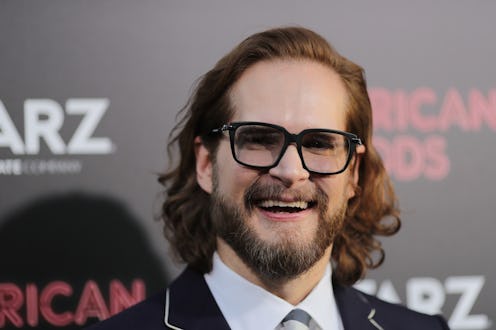
On Sunday, May 21, while Bryan Fuller's American Gods aired its fourth episode, David Lynch's Twin Peaks was being revived on Showtime and Ridley Scott's new release Alien: Covenant was ruling the box office. The timing of these things seems strangely fateful, since Fuller claims his shows, including Hannibal and American Gods, are inspired by Scott and Lynch. Speaking at a panel at the Vulture Festival in New York City, the showrunner also behind such cult hits as Pushing Daisies and Dead Like Me spoke about how those two iconic filmmakers informed his work — and what other freaky films and real-life horror stories have influenced him.
Growing up on movie novelizations, Fangoria magazine, and schlocky '70s and '80s horror movies like The Manitou, Kingdom Of The Spiders, The Car, and Orca, Fuller says he became obsessed with horror early on in life. But one fright flick from that era still stands out in his mind: the 1979 CBS miniseries Salem's Lot, based on the Stephen King novel of the same name. "One of the reasons this in particular was so disturbing is that it was one of the first instances where I saw a child die," Fuller remembered at the panel. "It helped helped me deal with mortality, but it also just serviced the idea that nobody is safe in a film — particularly in a horror film."
That same year, a movie came out that would change Fuller's life forever. Ridley Scott's original Alien is considered a classic in both the horror and the science-fiction genres… and Fuller credits it fully with the reason he became a filmmaker. "I was in classes to be a psychologist and every report that I wrote had something to do with movies," Fuller said. As a student of the mind, he found himself drawn to the Freudian mythology of the xenomorph, and the idea of "having something inside you that will destroy you."
In his experimental psychology class, the future showrunner conducted an experiment involving Alien to determine whether subjects "get more out of seeing a movie if [they] understand the psychological subtext, or if [they're] just enjoying it as a popcorn thriller." Although the results of his study were mixed, Fuller recalls that it resulted in his professor urging him to quit school and study film instead.
What had attracted Fuller to Alien in the first place was both its psychological subtext and its elaborate production design — and fans of his various TV shows will easily recognize both of those aspects in Fuller's work as well. But he also found himself drawn to the works of David Lynch for different reasons; namely, the auteur's ability to make real life seem like a "fever dream."
It didn't hurt that Fuller's own childhood was "very Lynch-ian", as he himself describers it. While he was growing up in eastern Washington state in the late 1970s, there was actually a very real serial killer operating in the region murdering young teenagers. Fuller described those years as being straight out of Twin Peaks, "in that it was small town America that was perverted in a very apple-pie way where, on the Fourth of July, somebody would go missing; when the carnival came to town, somebody would go missing." It's no wonder that, when Lynch's cult classic ABC series premiered in 1990, the scenario of teen queen Laura Palmer's murder in small town Washington felt eerily familiar to Fuller.
It also won't surprise any fans to hear that David Cronenberg was another big influence on Fuller, whose movies like Videodrome and The Fly — and their themes of "perversion of the body," as Fuller put it — can be seen reflected in Hannibal's many grisly murder tableaus or American Gods' fearsome deities. (Think tarantula-headed Mr. Nancy or Bilquis consuming the bodies of her lovers.) Outside of the classics, Fuller also finds inspiration in many modern horror movies, particularly crediting The Witch and The Babadook for their ability to "blur the lines" between reality and a sort of persistent, metaphorical dream state.
But it's yet another filmmaker who may inspire one of Fuller's next projects — one that's sure to delight "Fannibals" everywhere. The showrunner is loathe to give too many details about his ideas for Hannibal Season 4, considering he's still gunning to get it made, but he teasingly describes it as "Inception meets Angel Heart," referring to Christopher Nolan's Oscar-nominated sci-fi thriller, as well as the 1987 supernatural noir about a series of occult murders.
Given his many influences, when Hannibal Season 4 does finally come around, it's clear that viewers should expect plenty of blood and fantastic production values (Scott), the perversion of Americana (Lynch), grisly body dysmorphia (Cronenberg)… and dreams-within-dreams-within-dreams-within-dreams (Nolan). It's not even a sure thing yet, and I already can't wait.